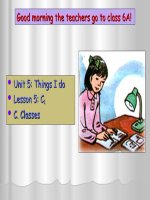unit 6-A
Bạn đang xem bản rút gọn của tài liệu. Xem và tải ngay bản đầy đủ của tài liệu tại đây (102.08 KB, 2 trang )
Date: 06/10/2010
Unit 6: Competitions
Period 30: Reading
I. Objectives: By the end of the lesson, Ss will be able to
- Develop such reading micro-skills as scanning for specific ideas, and identifying and correcting false
statements
- Use the information they have read to discuss the related topic.
II. Materials:
Text book, handout, posters.
III. Anticipated problem:
Ss may need to be provided appropriate linguistic resources so that they can complete various
learning tasks.
IV. Procedure:
Stage and time Procedure Interaction
Warm-up
7’
- Get Ss to work in pairs, matching the 4 given competitions with
the correct pictures on page 66.
- Check the answer with the whole class.
- T might want to get Ss to tell which of these competitions they
like most and why. T gets Ss to name some other competitions
that they know or have ever participated in and elicits their
comments on the events.
- T leads Ss to the lesson: Unit 6: Competitions
Group work
Before you read
10’
Pre- teach vocabulary
- Give the meanings of the words.
+ representative (n)
+ annual (adj.)
+ contest (n)
+ judge (n)
+ observe (v)
+ recite (v)
+ stimulate (v)
- Read first and ask Ss to repeat.
- Ask some Ss to read again.
Whole class
While you read
8’
Set the scene: You are going to read about a school’s
competition. Then you do the tasks that follow.
Task 1:
- Ask Ss to read the passage and then choose A, B, C, or D to
answer questions.
- Explain questions first and ask Ss to find the key words.
- Ask Ss to read the text again to do task 1.
- Ask Ss to work in pairs to do the tasks within 3 minutes.
- After 3 minutes, T checks their answers.
- Listen and ask them to explain.
- Correct their answers if necessary and give comments.
1. Who took part in the annual final English Competition last
week?
Pair work
Whole class
9’
A. The representatives of three classes of the school.
B. The good students of three classes.
C. English teachers.
D. Students from many schools.
2. What was the aim of the competition?
A. To get awards
B. To sponsor the poor students.
C. To improve English knowledge.
D. To stimulate the spirit of learning English among students.
3. Who sponsored the competition?
A. English teachers.
B. The Student’s Parents Society.
C. The head-master.
D. English speaking club.
4. What would be awarded to the winner?
A. A set of CDs for studying English.
B. A scholarship.
C. A set of CDs for studying English and an Oxford Advanced
Learner’s Dictionary.
D. An Oxford Advanced Learner’s Dictionary.
Answers: 1. A 2. D 3. B 4. C
Task 2
- T asks Ss to read through all the sentences in task 2.
- T also asks Ss to find the key words of each sentence.
- After that T asks Ss to read the text again to complete the
sentences and explain.
- After 3 minutes, T checks their answers and asks them to
explain.
- T corrects their answers if necessary.
Key:
1. In Activity 5, Hung was unable to recite / complete the poem.
2. Having achieved the highest score, Group B became the
winner of the competition.
3. Group C lost the game because they just got 60 points.
4. Nga encouraged her group by saying “For me most important
thing was our participation in the competition and the enjoyment
we had from it.”
Individual work
Pair work
Whole class
After you read
9’
- Read the poem aloud once or twice and get Ss to repeat each
line. T should draw Ss’ attention to the rhythm and intonation
when reciting the poem.
- Let Ss practise reciting the poem in their own groups. T goes
around and offers help.
- Call on different groups to read the poem and ask the class to
decide who the best performers are.
- Call on different groups to read their translations to the class.
Group work
Wrap-up
2’
- T summarizes the main points of the lesson.
- T asks Ss to do all the task again, learn by heart all the new
words at home and prepare lesson 2 – Speaking.
Whole class









